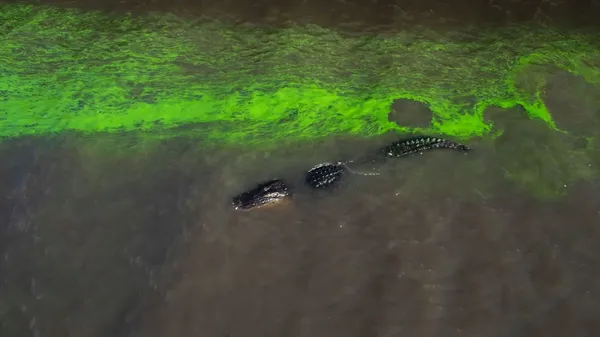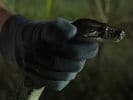Eye For Film >> Movies >> River Of Grass (2025) Film Review
River Of Grass
Reviewed by: Amber Wilkinson

Sasha Wortzel’s essayistic documentary flows through the Florida Everglades that are its focus as well as back and forth in time and between her observations of growing up there with those of author and conservationist Marjory Stoneman Douglas, who wrote non-fiction book The Everglades: River Of Grass and died, at the age of 108 in 1998.
Although it begins with talk of the impact of Hurricane Ian, we’ll come to learn that it’s humans who are the architects of the area’s greatest problems, our development exacerbating issues and causing fresh ones. As Stoneman Douglas succinctly puts it: “Man’s life on earth is limited by the conflict between his stupidity and his intelligence.”

Trying to improve the latter is Betty Osceola. A member of the Miccosukee Tribe, Osceola notes that Stoneman Douglas borrowed the River of Grass term from an indigenous description of the Everglades – something, it must be said, that we also see Stoneman Douglas acknowledge in archive footage. Osceola is what might be considered a practical environmentalist, educating people about the Everglades and leading prayer walks to help visitors and residents understand how development has led to Lake Okeechobee being imprisoned where once it was able to feed the Everglades periodically with its fresh water. If a prayer walk sounds esoteric, it’s based as much on physically showing people the landscape as anything spiritual, with the suggestion that it’s much harder to appreciate and care for something that you have never seen personally.
The natural beauty of the area is captured with sparkling serenity by cinematographer J Bennett as Wortzel’s film winds its way into the tributaries of many issues, from the burning of sugarcane, whose pollution chiefly affects the Black population (and for more on that blight, Hawaii-focused documentary Cane Fire is the one to watch) through to non-native snakes, algal blooms and fishing problems.
Editor Rebecca Adorno keeps a strong hand on the tiller, so that the movement between Wortzel’s poetic contemplation of what the waters mean to her and other residents, Stoneman Douglas’ archive interviews and historical detail of development in the area feel held in balance and dialogue. On screen text also helps to distinguish between Wortzel’s observations and those she reads from Stoneman Douglas’ writing.
A film that is all about fine balance and mankind’s ability to upset that without thinking, Wortzel also shows that environmental activism has made a difference to the area in the past and can still have an impact in future. As Stoneman Douglas puts it: “Conservation must be fought for unceasingly” – Wortzel, whose film received a Special Mention at Hot Docs, punches home her message as she joins those who continue the battle.
Reviewed on: 04 May 2025















